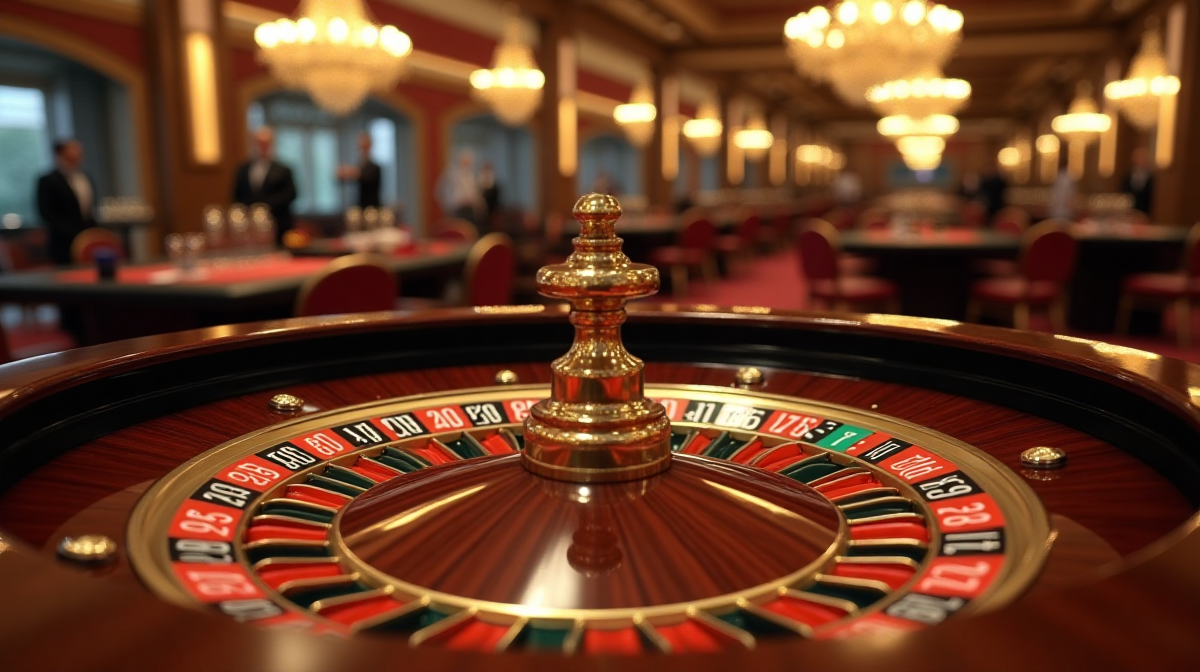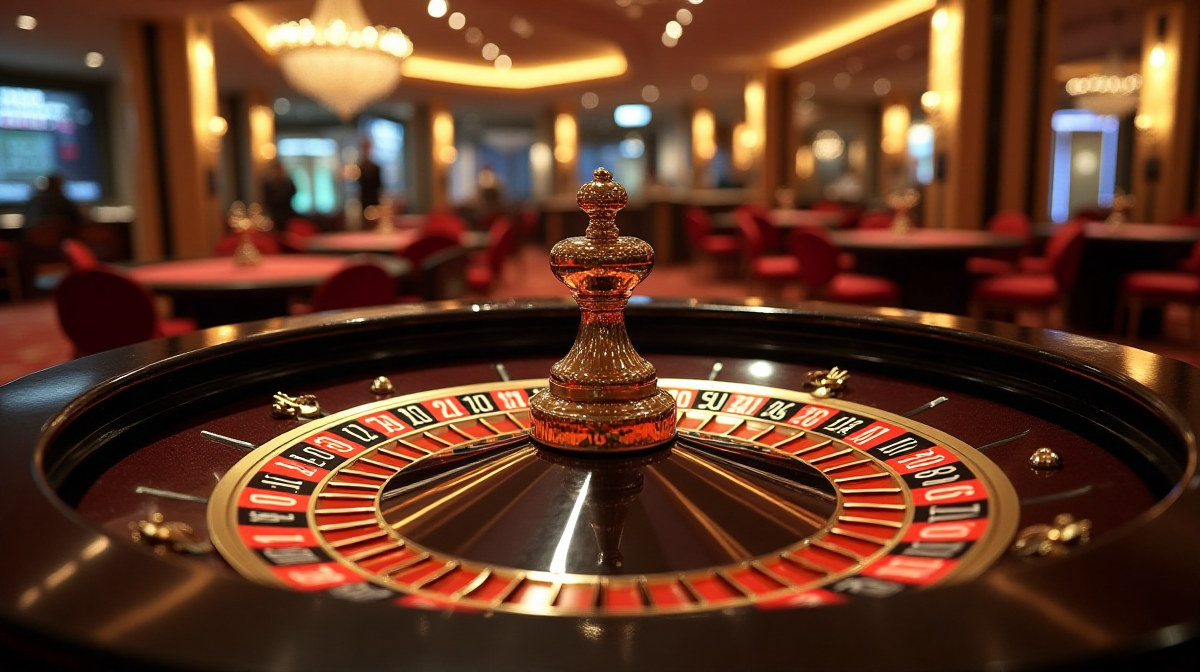No Way Out: Can You Beat the Roulette?
A Brief History of Roulette - From France to Global Casinos
Roulette, meaning “little wheel” in French, boasts a rich history dating back to 17th-century France. While its exact origins are debated, Blaise Pascal’s attempt to create a perpetual motion machine is often cited as a key influence. The modern game evolved over time, spreading from French casinos to become a staple in gambling establishments worldwide, captivating players with its simple yet compelling mechanics. Today, variations of the game are found everywhere from Monte Carlo to online platforms, and even in the realm of high-stakes, secretive games where a star bet could mean everything.
Why Roulette Captivates Players - The Psychology of Chance
The enduring appeal of roulette lies in its blend of chance and control. Players are drawn to the illusion of influence, meticulously placing bets while recognizing the ultimate outcome rests on the spin of the wheel. The anticipation as the ball bounces, the visual spectacle of the spinning wheel, and the quick resolution of bets all contribute to a uniquely exciting experience. This excitement is fueled by the inherent human fascination with risk and reward, making roulette a captivating pastime for many. Some even attempt to find an edge, hoping a successful bet star might change their fate.
The Core Concept: Understanding the Wheel, Ball, and Bets
At its heart, roulette is a game of predicting where a small ball will land on a spinning wheel divided into numbered and colored compartments. Players place bets on specific numbers, colors (red or black), or combinations of numbers. The payout odds vary depending on the type of bet placed, with higher payouts reserved for less probable outcomes. The core principle remains constant: a test of luck, punctuated by strategic betting choices. Understanding these choices is crucial, especially when considering a riskier play like a m star bet.
Understanding the Odds: Why the House Always Wins
Roulette Wheel Variations - European vs. American & Their House Edges
The type of roulette wheel significantly impacts the house edge. European roulette features a single zero, resulting in a house edge of approximately 2.7%. American roulette, however, includes both a zero and a double zero, increasing the house edge to 5.26%. This seemingly small difference dramatically affects long-term profitability for the casino. Players seeking the best odds will overwhelmingly favor the European version.
Probability Breakdown - Calculating the Odds of Common Bets
The probability of winning varies drastically with each bet. Betting on red or black offers nearly a 50% chance of success (slightly less due to the zero(s)). Odd/even bets have similar probabilities. However, betting on a single number carries a much lower probability of approximately 2.7% (European roulette) or 2.63% (American roulette). These probabilities dictate the payout ratios, with single-number bets offering the highest rewards but the lowest chances of winning.
The House Edge Explained - How it Guarantees Long-Term Profit for the Casino
The house edge represents the mathematical advantage the casino holds over players. It’s the percentage of each bet that the casino expects to retain in the long run. This isn’t a guarantee of winning on every individual bet, but rather a statistical certainty over thousands of spins. The house edge exists because the payouts are slightly less than the true odds of winning, ensuring the casino remains profitable. Even sophisticated strategies can't consistently overcome this inherent advantage. The allure of a star bet shouldn’t overshadow this fundamental truth.
Identifying ‘Sucker Bets’ - Bets with Exceptionally High House Edges
Certain bets offer significantly worse odds than others. The five-number bet (0, 00, 1, 2, 3) found on American roulette wheels is a prime example, boasting a house edge of 7.89%. This makes it a particularly unfavorable bet, often referred to as a sucker bet due to its low probability of winning and high house edge. Smart players avoid these bets in favor of options with more favorable odds.
Roulette Strategies: Fact vs. Fiction – Exploring Common Approaches
Progressive Betting Systems - Martingale, Reverse Martingale, D'Alembert
Progressive betting systems involve adjusting bet sizes based on previous outcomes. The Martingale system, perhaps the most well-known, doubles your bet after each loss, aiming to recover previous losses with a single win. The Reverse Martingale increases bets after wins. D'Alembert increases bets by one unit after a loss and decreases them by one unit after a win. All these systems are flawed. While they can yield short-term gains, they are susceptible to bankroll depletion and betting limits, ultimately unable to overcome the house edge. The thrill of a potential win, even with a star bet, doesn't negate these risks.
Non-Progressive Betting Systems - Labouchere, Fibonacci
Non-progressive systems, like Labouchere and Fibonacci, involve pre-determined betting sequences. Labouchere uses a sequence of numbers to determine bet sizes, while the Fibonacci system follows the Fibonacci sequence (1, 1, 2, 3, 5, 8…). Like progressive systems, these approaches don't alter the inherent house edge and can lead to significant losses if a losing streak persists. They offer a structured approach to betting but don’t guarantee profits.
The Flaw in All Betting Systems - Why They Can't Overcome the House Edge in the Long Run
The fundamental flaw in all roulette betting systems lies in the fact that past spins have no influence on future outcomes. Each spin is an independent event, governed by random chance. Betting systems can manage bankrolls and create the illusion of control, but they cannot alter the underlying probabilities. The house edge ensures that, over time, the casino will always come out ahead. Even with a calculated “m star bet”, the odds remain stacked against the player.
Cold & Hot Numbers - The Gambler’s Fallacy and Statistical Independence
The belief that certain numbers are due to hit (hot numbers) or are less likely to hit (cold numbers) is a manifestation of the gambler’s fallacy. This fallacy assumes that random events are self-correcting, leading players to believe past results influence future probabilities. In reality, each number has an equal chance of being selected on every spin, regardless of its recent history. Statistical independence dictates that past outcomes have no bearing on future ones.

Can Technology Help? – Exploring Tools and Software
Roulette Computers & Visual Ballistics - How They Work
Roulette computers attempt to predict the likely landing zone of the ball using sensors and algorithms. Visual ballistics analyzes the speed of the ball and wheel to estimate where the ball will fall. While theoretically possible to gain a slight edge, these devices are illegal in most jurisdictions and their use can lead to severe penalties. Furthermore, casinos employ countermeasures to detect and prevent their use. The fantasy of a guaranteed bet star through technology remains largely unfulfilled.
Roulette Simulators & Analyzers – What they can and can’t realistically achieve
Roulette simulators allow players to practice strategies and understand probabilities without risking real money. Analyzers can track past results and provide statistical insights, but they cannot predict future outcomes. These tools are valuable for learning the game and testing strategies, but they shouldn't be mistaken for a means of consistently winning.
Responsible Gambling Software – Tools to Manage Risk & Prevent Problem Gambling
Responsible gambling software offers features like deposit limits, loss limits, and self-exclusion options. These tools help players manage their bankrolls, prevent chasing losses, and avoid problem gambling. They are crucial for maintaining a healthy relationship with gambling and ensuring it remains a form of entertainment.
AI & Machine Learning – The Future of Roulette Prediction?
The application of AI and machine learning to roulette prediction is an area of ongoing research. While AI can analyze vast amounts of data and identify subtle patterns, the inherent randomness of the game presents a significant challenge. Current AI models are unlikely to consistently outperform the house edge. The appeal of a predictive algorithm, potentially identifying a lucrative “star bet”, is currently more science fiction than reality.
Legal and Ethical Considerations
The Legality of Using Devices in Casinos – Understanding Casino Rules & Surveillance
Using any electronic devices to assist in gambling, including roulette computers, is strictly prohibited in most casinos and is often a criminal offense. Casinos employ sophisticated surveillance systems to detect such activity and prosecute offenders.
Ethical Dilemmas – Is it Fair to Attempt to Beat the Casino?
The ethics of attempting to beat the casino are debatable. While casinos are businesses designed to generate profit, exploiting loopholes or using illegal devices is generally considered unethical and unlawful. Responsible gambling emphasizes playing fairly within the established rules.
Responsible Gambling Resources – Links to Support Organizations
(Content intentionally omitted as per instructions. This section would typically contain links to organizations like the National Council on Problem Gambling, Gamblers Anonymous, etc.)

Beyond the Math: Minimizing Risk and Maximizing Enjoyment
Bankroll Management – Setting Limits and Sticking To Them
Effective bankroll management is paramount. Before playing, determine a budget you’re willing to lose and stick to it. Divide your bankroll into smaller units and bet only a small percentage of your bankroll on each spin. This helps extend your playtime and minimizes the risk of significant losses.
Understanding Your Risk Tolerance – Playing Within Your Comfort Zone
Assess your risk tolerance before engaging in any gambling activity. If you're risk-averse, opt for lower-risk bets with smaller payouts. If you’re comfortable with higher risk, you can explore more speculative bets, but always within the confines of your budget. The idea of a star bet should never lead you to exceed your comfort level.
When to Walk Away – Recognizing Signs of Problem Gambling
Recognize the signs of problem gambling, such as chasing losses, betting more than you can afford to lose, or neglecting other responsibilities. If you experience these signs, seek help from a support organization. Knowing when to walk away is crucial for maintaining a healthy relationship with gambling.
Roulette as Entertainment - Embracing the Game for Fun, Not Profit
View roulette as a form of entertainment, not a source of income. Enjoy the thrill of the game, the social interaction, and the anticipation of the spin. Focus on having fun, and don't rely on gambling to solve financial problems or fulfill emotional needs.
Conclusion: The Reality of Beating Roulette
Recap: The Statistical Impossibility of Consistent Long-Term Wins
Despite the allure of winning and the proliferation of betting systems, consistently beating roulette in the long run is statistically impossible due to the inherent house edge. The game is designed to favor the casino over time. Even the most skilled players, attempting a carefully calculated “star bet”, will eventually succumb to the randomness of the wheel.
The Appeal of the Challenge – Why People Continue to Try
The challenge of attempting to overcome the odds, coupled with the excitement of potential rewards, continues to attract players to roulette. The human desire to beat the system and the thrill of taking risks are powerful motivators.
The Importance of Responsible Gambling and Having Fun.
Ultimately, responsible gambling is the key to enjoying roulette. Set limits, understand the risks, and prioritize fun over profit. Remember that roulette is a game of chance, and while winning is possible, it's not guaranteed. The pursuit of a star bet should never come at the expense of your financial well-being or mental health.

